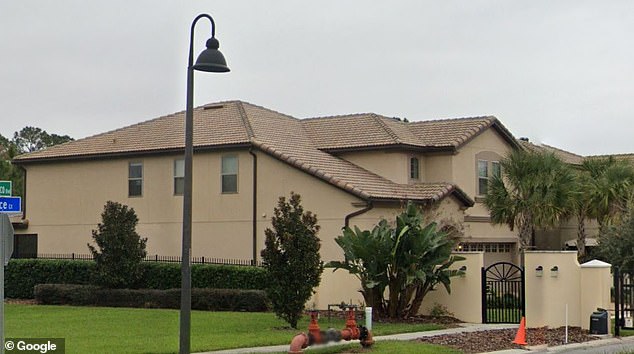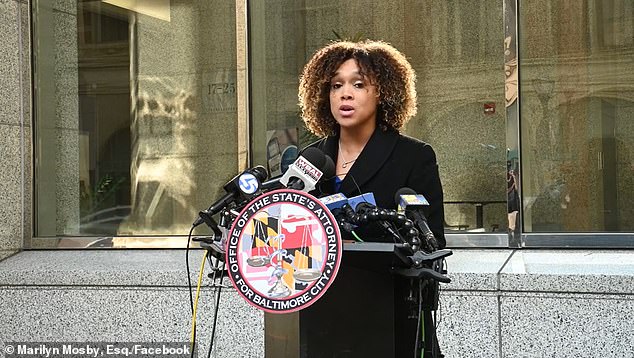Baltimore’s former top prosecutor Marilyn Mosby is found guilty of perjury after using bogus COVID hardship claim to raid her retirement funds and buy Florida vacation homes
A former chief prosecutor for the city of Baltimore has been convicted of lying on financial documents to improperly plunder pension funds to buy two vacation homes in Florida.
A federal jury convicted Marilyn Mosby of two counts of perjury on Thursday after prosecutors said she falsely claimed the COVID-19 pandemic had hurt her finances.
The former Baltimore State’s Attorney used the claim to withdraw $90,000 from her city pension account, and used the money as down payments to purchase a home in Kissimmee, Florida, and a condominium in Long Boat Key, Florida.
Prosecutors said Mosby’s gross salary was more than $247,000 in 2020 and was never reduced, but she claimed the pandemic damaged her various side businesses.
Mosby served two terms as Baltimore State’s Attorney. A federal grand jury indicted her on perjury charges before a Democratic primary candidate defeated her last year.
Former Baltimore State’s Attorney Marilyn Mosby leaves the federal courthouse in Greenbelt, Maryland, on Thursday after a jury convicted her of perjury.
Mosby rose to national prominence for prosecuting six Baltimore police officers after Freddie Gray, a black man, died in police custody in 2015, which was Mosby’s first year in office.
His death sparked riots and protests in the city, but none of the officers were ultimately convicted.
She was also in office when prosecutors dropped charges against Adnan Syed in the 1999 murder of Hae Min Lee after additional DNA testing ruled him out as a suspect in a case chronicled by the popular podcast “Serial.”
Mosby declined to testify before her attorneys rested their case Wednesday.
A spokeswoman for the Office of the State’s Attorney for Baltimore City, which led Mosby, declined to comment when reached by DailyMail.com after the verdict.
Mosby’s 2022 indictment accused her of unlawfully accessing pension funds by falsely claiming that the pandemic had damaged a travel-focused company she founded.
In 2020, at the height of the pandemic, Mosby withdrew $90,000 from the city of Baltimore’s deferred compensation plan. She received her full salary, about $250,000 that year.
She used the withdrawals as down payments to purchase a house in Kissimmee, Florida, and a condominium in Long Boat Key, Florida.
Prosecutors argued that Mosby was not entitled to access the funds under provisions of the Coronavirus Aid, Relief and Economic Security Act.
They said her company, Mahogany Elite Enterprises, had no customers or revenue and was not experiencing any “adverse financial impact” from the pandemic.

Mosby’s apartment in Longboat Key can be seen above

She also used the recordings as down payments to purchase this house in Kissimmee, Florida
“This case is about a lawyer and a public servant who put her own selfish interests ahead of the truth,” Assistant U.S. Attorney Sean Delaney told jurors Monday during the trial’s opening statements.
Mosby made separate withdrawals of $40,000 and $50,000 from the city pension plan. Prosecutors say the money in the account is held in trust and is the property of the city until a plan participant becomes eligible for withdrawal.
One of Mosby’s attorneys said she had the legal right to withdraw the money and spend it as she pleased. Mosby was telling the truth when she stated on paperwork that the pandemic was destroying her business, federal public defender James Wyda said.
During the trial’s closing arguments, Wyda said Mosby had spent time and money starting a company designed to help “women of color” in the business world travel to retreats.
“You know the world stopped when the pandemic hit” in 2020, Wyda told the judges. “What company or business involved in the pandemic didn’t shut down when the global pandemic hit?”
A. Scott Bolden, an attorney who initially represented Mosby but later withdrew from the case, has described the allegations as “bogus” and claimed the case is “rooted in personal, political and racial animus.”

One of Mosby’s lawyers said she had the legal right to withdraw the money and spend it as she pleased
During her tenure as state’s attorney, Mosby gained national recognition for her progressive policies and became a lightning rod for criticism from those who thought she went too far.
Among other high-profile decisions, Mosby stopped prosecuting certain low-level crimes, a practice her successor has reversed.
U.S. District Judge Lydia Kay Griggsby agreed to move Mosby’s trial from Baltimore to Greenbelt, Maryland, a suburb of Washington, D.C.
Mosby’s lawyers argued that she could not get a fair trial in Baltimore after years of negative media coverage.
Prosecutors opposed the change of venue, saying Mosby had sought and encouraged coverage of the case.
